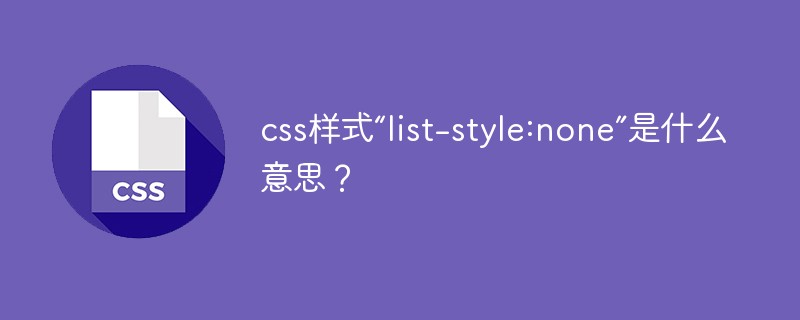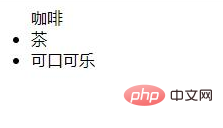What does the css style 'list-style:none' mean?
In CSS, the "list-style:none" style means that the type of the list item mark is set to be empty, that is, there is no mark before the list item. The default list item mark type of the list-style attribute is a solid circle. If the attribute value is set to none, the list item mark can be removed.

The operating environment of this article: windows10 system, css3, thinkpad t480 computer.
The "list-style:none" style indicates that the type of the list item mark is set to be empty, that is, there is no mark before the list item.
(Recommended tutorial: CSS video tutorial)
list-style shorthand attribute sets all list attributes in one statement.
This attribute is a shorthand attribute that covers all other list style attributes. Since it applies to all elements with display list-item, it can only be used on li elements in normal HTML and XHTML, but in fact it can be applied to any element and is inherited by list-item elements.
Attributes that can be set (in order): list-style-type, list-style-position, list-style-image.
The list-style-type attribute: You can set the type of list item tag.
The attribute value:
none No mark.
#disc Default. Markers are filled circles.
#circle The mark is a hollow circle.
#square Markers are solid squares.
#decimal Markers are numbers.
decimal-leading-zero Number mark starting with 0. (01, 02, 03, etc.)
lower-roman Lowercase Roman numerals (i, ii, iii, iv, v, etc.)
upper-roman Uppercase Roman numerals (I, II, III, IV, V, etc.)
- ##lower-alpha The marker is lower-alpha (a , b, c, d, e, etc.)
- upper-alpha The marker is upper-alpha (A, B, C, D, E, etc.)
- lower-greek Lowercase Greek letters (alpha, beta, gamma, etc.) ##lower-latin Lowercase Latin letters (a, b , c, d, e, etc.)
- upper-latin Uppercase Latin letters (A, B, C, D, E, etc.)
- hebrew Traditional Hebrew numbering system
- armenian Traditional Armenian numbering system
- georgian Traditional Georgian numbering system (an , ban, gan, etc.)
- ##cjk-ideographic Simple ideographic numbers
- hiragana Marks are: a, i, u, e , o, ka, ki, etc. (Japanese Hiragana characters)
- katakana Marks are: A, I, U, E, O, KA, KI, etc. (Japanese Katakana characters)
- hiragana-iroha Marks are: i, ro, ha, ni, ho, he, to, etc. (Japanese Hiragana serial number)
- katakana-iroha The marks are: I, RO, HA, NI, HO, HE, TO, etc. (Japanese katakana serial number)
- Example:
<html>
<head>
<style type="text/css">
.li1
{
list-style:none
}
</style>
</head>
<body>
<ul>
<li class="li1">咖啡</li>
<li>茶</li>
<li>可口可乐</li>
</ul>
</body>
</html>More For programming-related knowledge, please visit:  Programming Learning
Programming Learning
The above is the detailed content of What does the css style 'list-style:none' mean?. For more information, please follow other related articles on the PHP Chinese website!

Hot AI Tools

Undresser.AI Undress
AI-powered app for creating realistic nude photos

AI Clothes Remover
Online AI tool for removing clothes from photos.

Undress AI Tool
Undress images for free

Clothoff.io
AI clothes remover

AI Hentai Generator
Generate AI Hentai for free.

Hot Article

Hot Tools

Notepad++7.3.1
Easy-to-use and free code editor

SublimeText3 Chinese version
Chinese version, very easy to use

Zend Studio 13.0.1
Powerful PHP integrated development environment

Dreamweaver CS6
Visual web development tools

SublimeText3 Mac version
God-level code editing software (SublimeText3)

Hot Topics
 1384
1384
 52
52
 The Roles of HTML, CSS, and JavaScript: Core Responsibilities
Apr 08, 2025 pm 07:05 PM
The Roles of HTML, CSS, and JavaScript: Core Responsibilities
Apr 08, 2025 pm 07:05 PM
HTML defines the web structure, CSS is responsible for style and layout, and JavaScript gives dynamic interaction. The three perform their duties in web development and jointly build a colorful website.
 How to use bootstrap in vue
Apr 07, 2025 pm 11:33 PM
How to use bootstrap in vue
Apr 07, 2025 pm 11:33 PM
Using Bootstrap in Vue.js is divided into five steps: Install Bootstrap. Import Bootstrap in main.js. Use the Bootstrap component directly in the template. Optional: Custom style. Optional: Use plug-ins.
 How to write split lines on bootstrap
Apr 07, 2025 pm 03:12 PM
How to write split lines on bootstrap
Apr 07, 2025 pm 03:12 PM
There are two ways to create a Bootstrap split line: using the tag, which creates a horizontal split line. Use the CSS border property to create custom style split lines.
 How to resize bootstrap
Apr 07, 2025 pm 03:18 PM
How to resize bootstrap
Apr 07, 2025 pm 03:18 PM
To adjust the size of elements in Bootstrap, you can use the dimension class, which includes: adjusting width: .col-, .w-, .mw-adjust height: .h-, .min-h-, .max-h-
 Understanding HTML, CSS, and JavaScript: A Beginner's Guide
Apr 12, 2025 am 12:02 AM
Understanding HTML, CSS, and JavaScript: A Beginner's Guide
Apr 12, 2025 am 12:02 AM
WebdevelopmentreliesonHTML,CSS,andJavaScript:1)HTMLstructurescontent,2)CSSstylesit,and3)JavaScriptaddsinteractivity,formingthebasisofmodernwebexperiences.
 How to set up the framework for bootstrap
Apr 07, 2025 pm 03:27 PM
How to set up the framework for bootstrap
Apr 07, 2025 pm 03:27 PM
To set up the Bootstrap framework, you need to follow these steps: 1. Reference the Bootstrap file via CDN; 2. Download and host the file on your own server; 3. Include the Bootstrap file in HTML; 4. Compile Sass/Less as needed; 5. Import a custom file (optional). Once setup is complete, you can use Bootstrap's grid systems, components, and styles to create responsive websites and applications.
 How to insert pictures on bootstrap
Apr 07, 2025 pm 03:30 PM
How to insert pictures on bootstrap
Apr 07, 2025 pm 03:30 PM
There are several ways to insert images in Bootstrap: insert images directly, using the HTML img tag. With the Bootstrap image component, you can provide responsive images and more styles. Set the image size, use the img-fluid class to make the image adaptable. Set the border, using the img-bordered class. Set the rounded corners and use the img-rounded class. Set the shadow, use the shadow class. Resize and position the image, using CSS style. Using the background image, use the background-image CSS property.
 How to use bootstrap button
Apr 07, 2025 pm 03:09 PM
How to use bootstrap button
Apr 07, 2025 pm 03:09 PM
How to use the Bootstrap button? Introduce Bootstrap CSS to create button elements and add Bootstrap button class to add button text




